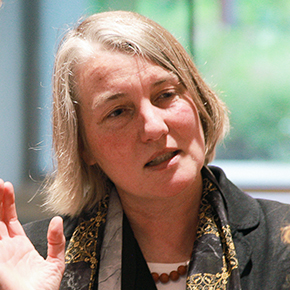Almut Suerbaum, Fellow and Tutor in German, delivered a lecture at Harvard this month on “Voices from the past: the poetic presence of medieval heroes in contemporary German literature”. Here, she explains why heroes are often ambivalent figures.
Heroes have always been complicated figures, especially in a Germanic context – and the German author Ulrike Draesner’s re-voicing of the medieval ‘Nibelungenlied’, which was the focus of the lecture, brings some of those tensions to the fore.
Draesner’s imaginative re-writing of a medieval epic as lyric monologue is evidence of the continuing fascination, but also ambivalence, towards heroism. In her essayistic writing, Draesner had focussed on the cultural differences, arguing that medieval concepts of collective identity are remote from contemporary culture.
Her version turns Hagen, the warrior who is often uncritically admired as a model of patriotic pride, into a psychopath – yet this ambivalence about Hagen’s ruthlessness in sacrificing himself as well as others for a cause has its roots in the medieval text.
By comparison, Draesner’s female figures may appear much more tame than their medieval counterparts – stitching, rather than beheading. Yet this underlines Draesner’s concern with the fabric of language and narrative, which in turn echoes that of the medieval text, albeit with a feminist turn in making female voices not just audible, but central to the survival of the story.
Questions of such re-voicing were also the topic of the keynote lecture, delivered on Thursday 25 October at the colloquium on Medieval German Studies at the University of Toronto, at which participants from Stanford, Berkeley, Princeton, Toronto, and Harvard presented aspects of their work.
Under the title ‘Alternative aesthetics and collective authorship: medieval German religious song’, I considered religious songs which defy contemporary aesthetic norms.
They are not the product of a single author but rather demonstrate a textual openness in which readers turn into writers, appropriating songs and strophes for their own circumstances and exploring multiple identities.
They move between Latin and the vernacular, between learned theology and popular song, between masculine and feminine roles, and even across religious divides, so that one and the same song can be included in Protestant as well as Catholic hymn-books.
Professor Suerbaum’s Harvard lecture was delivered at the invitation of the Mahindra Humanities Center and her colleague, Somerville alumna Racha Kirakosian, Associate Professor of German and the Study of Religion in Harvard.
